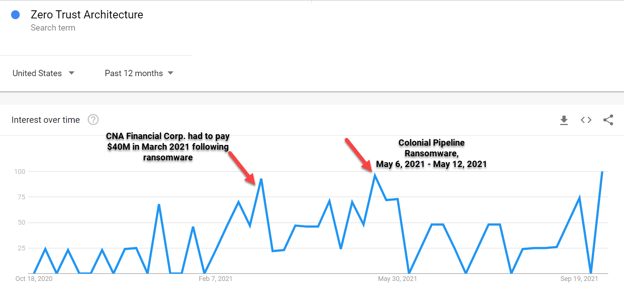As the threat from high competition lurks, secure your position in the market with Account-Based Marketing.
The October 7, 2021 outage of Facebook, Instagram, and WhatsApp left people worldwide idle for five hours and had them contemplating all possible theories behind the intense situation at the social media giant’s headquarters. I’m sure for many, our mental search engine optimization (SEO) was quick to spew stories of CYBERATTACKS on the top page of our brains. And there we were, talking in solidarity about the importance of cybersecurity in an ever-changing technology landscape.
Cybersecurity Is An Evolving Market
McAfee revealed in 2017 that cybercrime cost the world an estimated $600 billion and 2 billion people have had personal data stolen or compromised. Another report from INTERPOL shows an alarming rate of cyberattacks during COVID-19. Moreover, there has been a paradigm shift in:
- services being pushed to the cloud,
- increased remote working,
- growing focus on zero-trust architecture, and
- rising public demand for decentralized identity.
These shifts have made the cybersecurity industry important to private corporations and public institutions, now more than ever.
For example, Google searches trend for cybersecurity’s latest buzzword, “zero trust architecture,” rooted in the principle, “never trust, always verify.” According to the National Institute of Standards and Technologies, zero trust is a design approach to architecting an information technology (IT) environment that could reduce an organization’s risk exposure in a “perimeter-less” world.
A massive spike in the Google search interest over time was seen following significant ransomware attacks like CNA Financial Corp. in late March 2021, leading the company to pay $40 million to the hackers, and a similar frenzy in May following the Colonial Pipeline ransomware attack.

Gartner projected that businesses would spend more than $170.4 billion on security by 2022. Leveraging this opportunity, more players have jumped on the bandwagon to provide cybersecurity services, ultimately aggravating the threat from intense competition.
Setting foot and retaining a stronghold in this dynamically evolving industry isn’t easy and requires a well-structured approach in order to emerge as a leader.
Marketing To Secure Position In The Cybersecurity Industry
Psychologically speaking, the top-tier motivation of people seeking cybersecurity solutions is TRUST. And for all reasons humane, trust is neither sold nor marketed but built.
In addition, the complexity and diversity of the cybersecurity industry and its division into various verticals like infrastructure security, network security, infosec, cloud security, etc. means a one-size-fits-all approach won’t work.
Thus, marketing efforts to make a mark and build trust in cybersecurity have to be strategic and innovative. Enter account-based marketing (ABM).
ABM Is The Solution For Cybersecurity Marketing
ABM is a research- and strategy-driven approach that helps improve ROI, shorten the sales cycle, and engage the most valuable accounts by ensuring that you are talking to the right people at the right accounts and meeting their specific needs. It involves:
- Diverse target audience: From interviews with experts in cybersecurity, it was evident that there exist two contradictory opinions on audiences to target. While the experts in the field of identity and privileged access management wanted to refrain from targeting C-suite executives, the experts in the broader network access control industry had eyes on the top-level executives. In such diverse industries, thoroughly researched ideal customer profiles (ICPs), buyer personas, and target account lists (TALs) for segmentation prioritization are essential for aligning sales and marketing team efforts.
- Need for concrete content delivery: As we read about the Solarwinds cyberattack, Equifax data breach, Wikileaks, etc., we all have some context on the cybercrimes that shook organizations globally. People are naturally interested in knowing the technical details, so content with high-value information is effective for sales enablement. Popular and engaging types of content include technical white papers and case studies (which should be anonymous for privacy).
Yet when everyone has a similar strategy around these cybercrime buzzwords, how do you create differentiated content? The answer boils down to the ABM approach of identifying the individual buyers and creating content that meets their needs. - Focus on signal versus the noise: Market research and analysis of customer reviews for cybersecurity solutions reveal that a typical customer in the industry is highly invested and spends considerable time comparing multiple products and vendors before making a final decision. Thus, focusing on the signal through intent identification and personalization in real-time to optimize customer engagement is crucial to winning prospects.
ABM is a strategic approach, not an individual tactic. It creates a more direct and personalized dialogue between the buyer and the seller, building enduring relationships anchored on TRUST. And you know the rest of the story!
